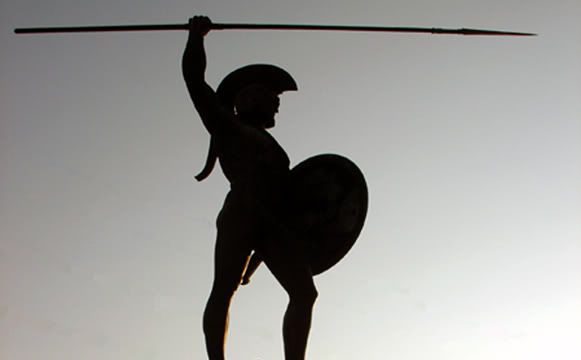
In this post I’m going to begin to show that the practice of immersive play, whether in the shape of an epic or in the shape of a game, creates communities, paradoxically, by simultaneously making the story about you and making you a member of a group of people that the story is about.
One of the funny things about the comparison I’m making in this blog is that the bards of the Odyssey clearly would have been extremely enthusiastic gamers if video games had been available to them. I venture to say that whereas the bards who gravitated towards the Iliadic stories might well have stuck with their oral epic, thank you very much, the Odyssey bards would have dropped their lyres and picked up their controllers without a second thought.
The reason I venture to say that is that when Odysseus tells the Phaeacians the story of his adventures, he anticipates the “emergent gameplay” of games like Oblivion by about 2500 years.
I need to lay it out on the line that I’m convinced that the Odyssean bards (or perhaps just the more clever among them) wanted to make their audiences suspect very strongly that Odysseus is not being truthful in his account of his adventures. I could spend a long, long time producing all the evidence that I think points to that conclusion, but I’m hoping that I can at least sow a fatal seed of doubt in your mind by calling attention to the simple fact that if the adventures are true, the story would be at once the only true story Odysseus tells in the entire epic and the only story he tells that isn’t plausible on its surface.
At some point, we’ll probably come to talk about the other lies Odysseus tells in the epic in detail, but suffice it to say for now that in order to get home in the style he wants, he needs to tell some whoppers. These whoppers don’t involve man-eating giants, nor even singing ladies who’ll lead you to your death on the rocks. They’re eminently plausible stories of what might happen to a guy trying to make a success of himself in archaic Greece.
The adventures aren’t like that. They’ve got the man-eating giants, and the singing ladies, and a king whose fifty daughters and fifty sons are married to each other and who controls the winds, and a bona fide daughter of the sun, and a trip to the land of the dead. But even if you won’t go with me to the place where we say, “Odysseus is lying,” maybe you’ll at least let me say that Odysseus has a kind of bardic control over his story. He does, after all say
But your spirit was inclined to ask me about my mournfulThat is, he gets to decide in what order to play the story, just as a bard had the very same power in recomposing the stories of the epic tradition, just as a gamer in a great many games (Grand Theft Auto, Oblivion and Mass Effect spring to mind) can decide which part of the game to play next.
sufferings, so that I must mourn and grieve even more.
What then first, what last should I recite to you?
But that should be old hat by now. The first thing the adventures add to the mix is that they’re focussed on the guy who’s telling them. Right after the bit about “what then first,” he says this:
Now first I will tell you my name, so that all of youNot exactly modest, is he?
may know me, and I hereafter, escaping the day without pity,
be your friend and guest, though the home where I live is far away from you.
I am Odysseus, son of Laertes, known before all men
for the study of crafty designs, and my fame goes up to the heavens.
Now the word Richmond Lattimore translates “fame” is a very important word indeed. The Greek is kleos, and it can also be translated “reputation,” or (and this is how most people do it) “glory.” It’s a word that comes from a verb that means “to listen,” and, therefore, has everything to do with who hears about you in the tales that singers sing about you.
At this moment, Odysseus therefore has an opportunity no other epic hero ever has—to control his own kleos directly, as a gamer controls his own performance and his own prowess in the narrative of the game. The story of a game is about you, or about me—it’s about the player. Strangely, though, the game equivalent of kleos isn’t really becoming famous as a marvelously skillful gamer (a la the great Halo players like the Ogres and the other stalwart warrior of Major League Gaming), though there are comparisons to be made there, I believe. No, the real game equivalent of kleos is connecting with the audience, with the community.
After all, Odysseus has just had Demodocus give him standard epic fame and glory by singing the tale about the Trojan horse. That wasn’t just so that people a long way away would talk about him in some distant future. It was so someone would finally ask him who he is. Now, the purpose of telling the Phaeacians his name isn’t so they’ll say “Man, that Odysseus—he’s so cool!” The purpose is in order that they be friends, guests and hosts in the sacred traditions of xenia, guest-friendship.
That is, the activity of making kleos, as a bard or as a player, is about forming an affinity group—people who think the game is a cool game, who want to talk about it, who would go to the mat for it. It’s about making fanboys. Odysseus is going to turn the Phaeacians into Odysseus fanboys, just as the bard of Odyssey 9 is going to turn his audience into fanboys of the Odyssey, just as he the bard is already such a fanboy.
Or do you really think that Halo fans and World of Warcraft fans wouldn’t defend the fame and glory of their game to the death? If the Master Chief came to dinner, wouldn’t a Halo fan give him a ride home to UNSC HQ?
Why? Because the game is actually about the gamer, just as Odysseus’ story is actually about the Phaeacians. First I’ll tell you my name, so that I can be your friend. As we’ll see, Odysseus’ story and friendship change them profoundly as a community, just as games build, and then change their communities.
Next time: Phaeacian immersion.


